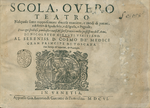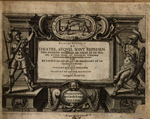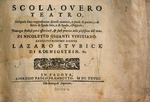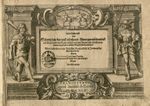|
|
You are not currently logged in. Are you accessing the unsecure (http) portal? Click here to switch to the secure portal. |
Difference between revisions of "Scola, overo teatro (Nicoletto Giganti)"
| Line 33: | Line 33: | ||
| [http://www.internetculturale.it/jmms/iccuviewer/iccu.jsp?teca{{=}}MagTeca+-+ICCU&id{{=}}oai:www.internetculturale.sbn.it/Teca:20:NT0000:RMLE040288 Digital scans] (1606) | | [http://www.internetculturale.it/jmms/iccuviewer/iccu.jsp?teca{{=}}MagTeca+-+ICCU&id{{=}}oai:www.internetculturale.sbn.it/Teca:20:NT0000:RMLE040288 Digital scans] (1606) | ||
| B&W photocopy vol. 1 (<span class{{=}}"plainlinks">[http://mac9.ucc.nau.edu/manuscripts/giganti.pdf A] / [http://mac9.ucc.nau.edu/manuscripts/Giganti-2.pdf B]</span>) (1606) | | B&W photocopy vol. 1 (<span class{{=}}"plainlinks">[http://mac9.ucc.nau.edu/manuscripts/giganti.pdf A] / [http://mac9.ucc.nau.edu/manuscripts/Giganti-2.pdf B]</span>) (1606) | ||
| + | | [http://books.google.com/books?id{{=}}0AGIgRSjcloC Digital scans] (1619) | ||
| [http://www.umass.edu/renaissance/sites/default/files/assets/renaissance/lord/Giganti_1619.pdf B&W photocopy] (1619) | | [http://www.umass.edu/renaissance/sites/default/files/assets/renaissance/lord/Giganti_1619.pdf B&W photocopy] (1619) | ||
| [http://mdz-nbn-resolving.de/urn:nbn:de:bvb:12-bsb11234843-6 Digital scans] (1622) | | [http://mdz-nbn-resolving.de/urn:nbn:de:bvb:12-bsb11234843-6 Digital scans] (1622) | ||
| Line 41: | Line 42: | ||
| [http://data.onb.ac.at/rep/106B1420 Digital scans] (1644) | | [http://data.onb.ac.at/rep/106B1420 Digital scans] (1644) | ||
| [http://diglib.hab.de/drucke/xb-7532-1s/start.htm Digital scans] (1644) | | [http://diglib.hab.de/drucke/xb-7532-1s/start.htm Digital scans] (1644) | ||
| + | | [http://books.google.com/books?id{{=}}JxdFM5q5zQoC Digital scans] (1644) | ||
}} | }} | ||
| below = | | below = | ||
| Line 50: | Line 52: | ||
''Scola, overo teatro'' was first printed in Venice in 1606 by Giovanni Antonio and Giacomo de' Franceschi, with illustrations by [[Odoarco Fialetti]]. The Grand Duchy of Tuscany granted Giganti a special protection against unauthorized reprints for a term of 30 years, including a fine of 300 ducats. This copyright was repeatedly ignored, however, including a 1628 edition published in Padua by Paolo Frambotto, which included an additional dedication from the publisher to Lazaro Stubick di Kœnigstein. Bibliographies also list printings in 1608 and 1610; the first is probably a mistaken reference to ''[[Libro secondo (Nicoletto Giganti)|Libro secondo]]'', whereas the second seems to be spurious (or possibly a mistaken reference to the treatise of [[Ridolfo Capo Ferro da Cagli|Ridolfo Capo Ferro]]). | ''Scola, overo teatro'' was first printed in Venice in 1606 by Giovanni Antonio and Giacomo de' Franceschi, with illustrations by [[Odoarco Fialetti]]. The Grand Duchy of Tuscany granted Giganti a special protection against unauthorized reprints for a term of 30 years, including a fine of 300 ducats. This copyright was repeatedly ignored, however, including a 1628 edition published in Padua by Paolo Frambotto, which included an additional dedication from the publisher to Lazaro Stubick di Kœnigstein. Bibliographies also list printings in 1608 and 1610; the first is probably a mistaken reference to ''[[Libro secondo (Nicoletto Giganti)|Libro secondo]]'', whereas the second seems to be spurious (or possibly a mistaken reference to the treatise of [[Ridolfo Capo Ferro da Cagli|Ridolfo Capo Ferro]]). | ||
| − | In 1619, still within the copyright period, the treatise was translated into French and German and published in Frankfurt by Jacob de Zeter. He published separate French and German versions titled ''Escrime Novvelle ov Theatre'' ("New Fencing or Theater") and ''Newe Fechtkunst Oder Schawplatz'' ("New Fencing Art or Show Place"), containing the main text in both languages but the preface in only one.<ref>I'm not aware of any extant copies of the 1619 German edition, but since both editions exist in the 1622 and 1644 reprints, it seems reasonable to assume they were created at the same time.</ref> Zeter also included translations of book 1 of [[Salvator Fabris]]' 1606 treatise, which has oddly lead various fencing historians to accuse Giganti himself of plagiarism. This parallel edition was reprinted in 1622 and 1644. | + | In 1619, still within the copyright period, the treatise was translated into French and German and published in Frankfurt by Jacob de Zeter. He published separate French and German versions titled ''Escrime Novvelle ov Theatre'' ("New Fencing or Theater") and ''Newe Fechtkunst Oder Schawplatz'' ("New Fencing Art or Show Place"), containing the main text in both languages but the preface in only one.<ref>I'm not aware of any extant copies of the 1619 German edition, but since both editions exist in the 1622 and 1644 reprints, it seems reasonable to assume they were created at the same time.</ref> Zeter also included translations of book 1 of [[Salvator Fabris]]' 1606 treatise, which has oddly lead various fencing historians to accuse Giganti himself of plagiarism.<ref>This accusation was first made by [[Johann Joachim Hynitzsch]], who attributed the edition to Giganti rather than Zeter and was incensed that he gave no credit to Fabris.</ref> This parallel edition was reprinted in 1622 and 1644. |
In 2010, ''Scola, overo teatro'' was translated into English by Tom Leoni and published by [[Freelance Academy Press]] under the title ''Venetian Rapier: The School, or Salle''. A second English translation, titled ''Nicoletto Giganti's the School of the Sword'' was released in 2014 by Aaron Taylor Mediema. | In 2010, ''Scola, overo teatro'' was translated into English by Tom Leoni and published by [[Freelance Academy Press]] under the title ''Venetian Rapier: The School, or Salle''. A second English translation, titled ''Nicoletto Giganti's the School of the Sword'' was released in 2014 by Aaron Taylor Mediema. | ||
| Line 80: | Line 82: | ||
{{image|h=1|Giganti Title 1606.png|1606}} | {{image|h=1|Giganti Title 1606.png|1606}} | ||
| − | {{image|h | + | {{image|h=1|Giganti French Title 1619.png|1619 (French)}} |
{{image|h=1|Giganti German Title 1619.jpg|1619 (German)}} | {{image|h=1|Giganti German Title 1619.jpg|1619 (German)}} | ||
| − | {{image|h | + | {{image|h=1|Giganti French Title 1622.jpg|1622 (French)}} |
{{image|h=1|Giganti German Title 1622.jpg|1622 (German)}} | {{image|h=1|Giganti German Title 1622.jpg|1622 (German)}} | ||
{{image|h=1|Giganti Title 1628.png|1628}} | {{image|h=1|Giganti Title 1628.png|1628}} | ||
Revision as of 15:47, 17 July 2020
| Scola, overo teatro | |
|---|---|
| School, or Fencing Hall | |
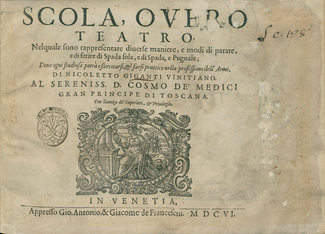 | |
| Full title | Scola, overo teatro, nelquale sono rappresentate diverse maniere, e modi di parare, e di ferire di spada sola, e di spada, e pugnala |
| Author(s) | Nicoletto Giganti |
| Illustrated by | Odoarco Fialetti |
| Dedicated to | Cosimo II de' Medici |
| Place of origin | Siena, Tuscany |
| Language | Italian |
| Genre(s) | Fencing manual |
| Publisher | Giovanni Antonio & Giacomo de' Franceschi |
| Publication date | 1606, 1610, 1619, 1622, 1628, 1644 |
| Pages | 95 pages |
| Treatise scans |
Digital scans (1619)
|
Scola, overo teatro ("School, or Fencing Hall") is an Italian fencing manual written by Nicoletto Giganti and printed in 1606. It treats the use of the single rapier and the rapier and dagger. The treatise is structured as a series of progressively more complex lessons, and Tom Leoni opines that this treatise is the best pedagogical work on rapier fencing of its time.[1] Based on the number of republications over the succeeding decades it seems to have been quite popular, and fencing historians have praised it both for its organization and as the first text to fully describe the use of the lunge.
Contents
Publication History
Scola, overo teatro was first printed in Venice in 1606 by Giovanni Antonio and Giacomo de' Franceschi, with illustrations by Odoarco Fialetti. The Grand Duchy of Tuscany granted Giganti a special protection against unauthorized reprints for a term of 30 years, including a fine of 300 ducats. This copyright was repeatedly ignored, however, including a 1628 edition published in Padua by Paolo Frambotto, which included an additional dedication from the publisher to Lazaro Stubick di Kœnigstein. Bibliographies also list printings in 1608 and 1610; the first is probably a mistaken reference to Libro secondo, whereas the second seems to be spurious (or possibly a mistaken reference to the treatise of Ridolfo Capo Ferro).
In 1619, still within the copyright period, the treatise was translated into French and German and published in Frankfurt by Jacob de Zeter. He published separate French and German versions titled Escrime Novvelle ov Theatre ("New Fencing or Theater") and Newe Fechtkunst Oder Schawplatz ("New Fencing Art or Show Place"), containing the main text in both languages but the preface in only one.[2] Zeter also included translations of book 1 of Salvator Fabris' 1606 treatise, which has oddly lead various fencing historians to accuse Giganti himself of plagiarism.[3] This parallel edition was reprinted in 1622 and 1644.
In 2010, Scola, overo teatro was translated into English by Tom Leoni and published by Freelance Academy Press under the title Venetian Rapier: The School, or Salle. A second English translation, titled Nicoletto Giganti's the School of the Sword was released in 2014 by Aaron Taylor Mediema.
Contents
| i - v | Preface by Nicoletto Giganti |
|---|---|
| vii - xiv | Publisher's preface |
| 1 - 47 | Rapier by Nicoletto Giganti |
| 48 - 95 | Rapier and dagger by Nicoletto Giganti |
Gallery
Title pages
Illustrations
Additional Resources
- Leoni, Tom. Venetian Rapier: The School, or Salle. Nicoletto Giganti's 1606 Rapier Fencing Curriculum. Wheaton, IL: Freelance Academy Press, 2010. ISBN 978-0-9825911-2-3
- Miedema, Aaron Taylor. Nicoletto Giganti's the School of the Sword: A New Translation by Aaron Taylor Miedema. Legacy Books Press, 2014. ISBN 978-1927537077
References
- ↑ Leoni, p xi.
- ↑ I'm not aware of any extant copies of the 1619 German edition, but since both editions exist in the 1622 and 1644 reprints, it seems reasonable to assume they were created at the same time.
- ↑ This accusation was first made by Johann Joachim Hynitzsch, who attributed the edition to Giganti rather than Zeter and was incensed that he gave no credit to Fabris.
Copyright and License Summary
For further information, including transcription and translation notes, see the discussion page.
| Work | Author(s) | Source | License |
|---|---|---|---|
| Images | |||
| Transcription | Index:Scola, overo teatro (Nicoletto Giganti) |

